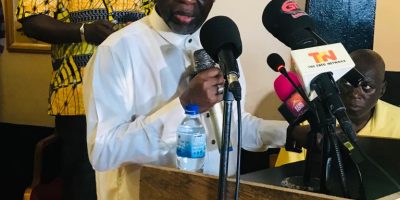 by Alagi Yorro Jallow
by Alagi Yorro Jallow
Former Managing Director of the Social Security and Housing Finance Corporation (SSHFC), apart from being a novice in politics, his intellection, and rare skillsets as a seasoned administrator, in private and in public administration are prepared for delivery at the point where Julius Caesar found himself on January 10, 49. He must utter the words, “Alea iacta est” (“The die is cast”), a Latin phrase attributed by Suetonius (as iacta alea est ) to Julius Caesar on January 10, 49 BC as he led his army across the Rubicon river in Northern Italy.
Fatoumatta: With this step, he entered Italy at the head of his army in defiance of the Senate and began his long civil war against Pompey and the Optimates.
Caesar is not taking this lightly. He knows that if he marches on Rome with his armies, then he is a public enemy and that he will either have to win or die.
For a Roman patrician like Julius Caesar, there is no life without military service; there is no life without help to the state. He cannot simply ‘go native’ and stay in Gaul, and he does realize that if he goes back to Rome, he would be killed.
At this time, the northernmost border of the Roman territory in Italy is the River Rubicon. Once someone crosses the River Rubicon, he is in Roman territory. A general must not cross that boundary with his army – he must do what the Romans call to lay down his command, which means surrender his right to order troops, and indeed not be carrying weapons.
Caesar and his armies hesitate quite a while at this river while Caesar decides what to do. He informs his soldiers that it is a little tiny bridge across the river, but once they cross it they will have to fight their way to Rome, and Caesar is well aware that he is risking not just his own life, but those of his loyal soldiers, and he might not win. Pompey is a formidable enemy. It is also impossible to avoid the fact that Caesar was attacking the state, and as a patrician Roman, this would have been very difficult for him, equivalent to beating up your father. He would not have done any of this lightly.
Finally, he makes a decision, it is time to go, and he uses a gambling metaphor: he says ‘Roll the dice,’ ‘Alea jacta est.’ Once the dice start rolling, they cannot be controlled, even though we do not know what it is as the dice roll and tumble. Julius and his men swiftly cross the river, and they march double-time toward Rome.
Fatoumatta: Serving in a top government job is the highest honor the President can bestow on any citizen. As a cabinet minister, permanent secretary, and managing director, one serves at the pleasure of the appointing authority. The President requires no reason or excuse to fire. The appointing command, in this case, the President, may fire if he loses confidence in his appointee. Being a managing director is not an entitlement, considering that you have been chosen to serve from a pool of very many eligible citizens. It is never a permanent job.
Fatoumatta: Decent people resign if their political ambitions are opposed to their continued serving in government. However, the incoherent self-appointed “power broker” had to suffer the embarrassment of being sacked. This is the consequence of the rise and fall of ‘Bravado Politics.’ In local parlance, politics of credentialism is the kind of politics well perfected by Gambians and in the Diaspora community. Fatoumatta: Mr.Mohammed Manjang, a seasoned administrator, has fallen in the hands of ill-prepared political opportunists. Mr. Manjang has an extra-ordinary charm for his strength and efforts in his communication skills that strengthen his diplomacy and public relations between peoples, scarce attributes to persons in the Gambia. In diplomacy as well in public relations, usually, they do not mean what they say, it is in the actions of a diplomat that one can decipher “diplomatic” language. Diplomacy is supposed to be “polite.” So when Muhammed Manjang appears before the media for his personal and credentialism branding to his fans and supporters smile with him, that was not an indication that they loved him. He has always been measured and colorful in his public relations outings on social media. Mr. Manjang’s actions spoke loudly in his several interviews. Instead, he assumes that a “diplomatic” credentials in him a guarantee in his next endeavors. International politics, as is with all politics, is a game of horse-trading.
Fatoumata: The Gambia’s politics is based on false “bravado.” We have a habit of celebrating everything even before we succeed, for we are a nation of public relations, empty rhetoric. Most of our politics and professionalism are driven by excitement and not substance. Bravado and empty publicity do not cut it. Substance does.
Fatoumatta: We hope next time Mr. Manjang seeks to influence domestic politics; his actions will not be driven by parochial interests and empty shuttle of credentialism and an inexperienced political upstarts. Still, he can tap into the country’s collective “NATIONAL” interest. Bravado may not have suited Mr. Manjang locally, but bravado has no place in national politics. Domestic politics is the playground for suave politicians.
Fatoumata: As a person, Mohammed has solid credentials. He lives to fight another day. He now has the chance to focus on the substance of good governance and best practices to hold the government accountable to practice with due process in all levels of government. This will be a more significant victory for the Mohammed Manjang to be a future political project in The Gambia. The rest is history! Will Mohamed Manjang cross the Rubicon, now, and book a date with destiny.
Will Mohamed Manjang Cross the Rubicon?




Ma sha Allah great and thanks for sharing